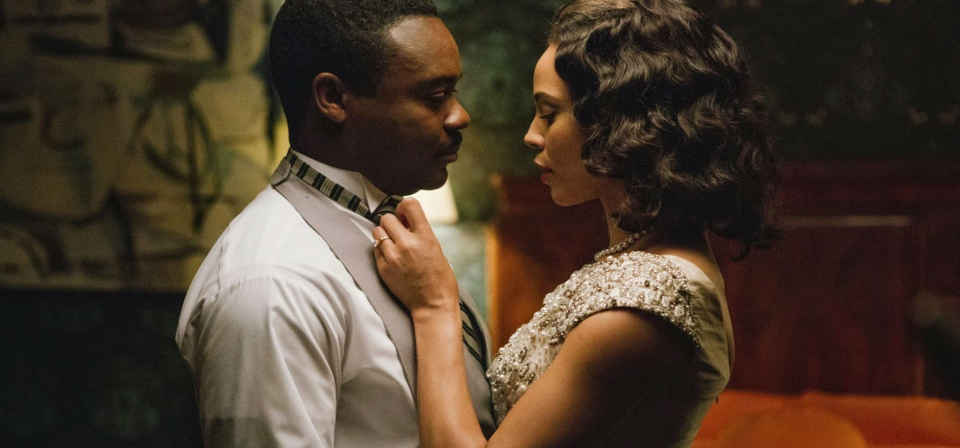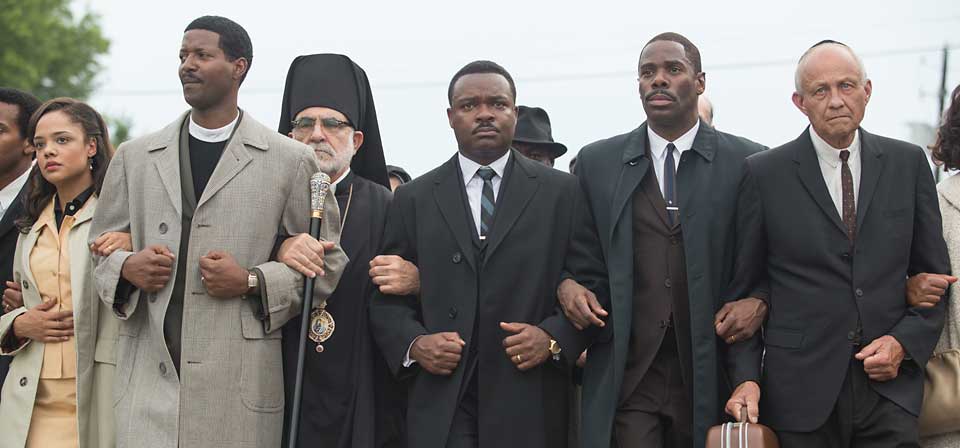Interview: Selma Actor David Oyelowo on Playing Martin Luther King Jr.
The star of the new civil-rights drama talks with SDG about his Christian faith, playing an American icon and why it was important to him that Selma depict the role of religion in the civil-rights movement
If an actor in a faith-based indie like Son of God told you he felt God had told him he was meant to play the role in question, you might not bat an eye. It’s more striking to hear such a thing from the star of a $20-million Hollywood film like the civil-rights drama Selma — from an actor who has played in such films as Interstellar, The Butler and Rise of the Planet of the Apes.
SDG: This is your second cinematic trip to Selma, after The Butler, in which your character demonstrated with Dr. King. Did that role in any way prepare you for this one or shape your perspective on it?
Oyelowo: I first met Lee Daniels, who directed The Butler, auditioning to play Dr. King in Selma. When we couldn’t get [Selma] off the ground due to budgetary constraints, [Daniels] and I went off and did The Butler instead.
I had first read the script [for Selma] in 2007, and I had felt God tell me that I was going to play Dr. King in this film. So when I was finally cast in 2010, I thought, “Wow, here we go — God was right; I’m going to play this role.” And then I found myself playing opposite Dr. King in a completely different film. I can’t say that it prepared me; in all honesty, it sort of perplexed me at the time. But doing films like The Butler, Red Tails, The Help and, indeed, Lincoln actually did all go towards preparing me for Selma, because I’m British, and all of those films required an enormous amount of research, all of which helped me, knowledge-wise, preparing for Selma.
SDG: Of course, you’re well aware how few portrayals of Dr. King there have been — and no feature films focusing on him, until now. Likewise, 12 Years a Slave was the first big-screen feature film about the experience of slavery from the point of view of actual slaves. Why do you think films like this are finally being made?
Oyelowo: I think that having a black president in this country has been a seismic shift, in terms of what has been going on racially in America. I think that America is now engaging with how we have come to this point. I think these films give context to the moment we are now in, in terms of not only having a black president, but also just where we are as a nation.
SDG: With respect to positive religious themes, Selma is much more overt than many recent films, from The Butler and The Help to Lincoln and Belle, in depicting religion in opposition to racism and the legacy of slavery. How important was it to you that the religious worldview and motivations of Dr. King and his allies be represented in Selma?
Oyelowo: It was absolutely crucial to me, because it is the truth. These people — not just Dr. King, but his band of brothers and sisters — a lot of them were ministers. A lot of them were pastors, preachers, reverends, bishops in their own churches. They were the leaders within the black community. They didn’t just preach from the pulpit — they lived it out in their lives. That’s why nonviolence was what Dr. King was a proponent of. That’s why they chose to use love as a weapon against hate — because that’s what the Bible advocates. That’s what they believed in as people of faith. And that’s what proved, ultimately, to be successful.
On the Edmund Pettus Bridge [in Selma], during the [1965] summer campaign, if they had fought back, if they had brought guns or attacked the police, I almost guarantee you that the Voting Rights Act would not have been passed in August of that year. It would have been a self-fulfilling prophecy for racists that these people were not worthy to vote. Like Dr. King said, darkness cannot overcome darkness; only light can do that. Hate cannot overcome hate; only love can do that. That was a theme that had to be in the film and, thankfully, is.
SDG: Did you personally have any input in that regard?
Oyelowo: I did. When Ava DuVernay came on board, I recommended her for the role of director, and the reason I recommended her is because we are of a very similar mindset. We have a very similar worldview, and I always knew that, even though I felt God had called me to play this role, I would never play it if it was in any way contrary to what I felt was right to be in this film.
There is just no getting away from the fact that, when Bloody Sunday happened, Dr. King specifically asked for men and women of faith to come and join this struggle, because he didn’t want it to turn into a bloody riot. He wanted people there who were of a similar mind, who were going to operate in love rather than hate, anger and bitterness. We would just be doing them and the story a disservice if it was any way but what we have in the film.
SDG: Do you have any thoughts on why other films have had less interest in the role of religion in this respect?
Oyelowo: The fish stinks from the head down. If you as a director, a producer, a writer are not particularly interested — or in fact believe — in God as a beautiful Being from which love emanates, from which sacrificial love is the key … I think if you are not a person of faith, you probably are not looking at these stories through that lens. And, whether we like to admit it or not, as artists, we do project our own worldview on to what we do. And so I think that if you are coming from a different perspective, from a faith point of view, you impose that on these stories, and it inevitably creeps into the result.
SDG: You’ve talked in interviews about wanting to portray Dr. King as a human being rather than as an icon. Can you be specific about that?
Oyelowo: I think that, in many ways, Dr. King has been diminished by the iconography that he has been subjected to. It has allowed us to box him into a catchphrase — “I have a dream.” It has allowed us to minimalize his achievements to basically giving a speech at the end of the March on Washington. Whereas, actually, he spent 13 years of his life, virtually every day, campaigning for and fighting for people who had been marginalized and subjected to racism. He was a voice to the voiceless, and he did that tirelessly, and his faith was the engine to that.
But he was just a human being, at the end of the day. I still believe we go to the movies to see ourselves, and if we can see ourselves in Dr. King, I think that is really potent and powerful; and the only way you would see yourself in Dr. King is if he’s a human being. He didn’t walk around when he was on this earth thinking of himself as an icon; so, therefore, in the portrayal of him, one has to take that away and play him as a human being.
SDG: What do you think is the task confronting Christian churches today regarding race relations? It’s bad enough that we have white churches and black churches, but worse is, so often, we aren’t even on the same page. What could each, for lack of a better word, “side” be doing differently to help bridge the gap and improve the situation?
Oyelowo: I’m glad you asked that! One of the beautiful byproducts of the film has been an initiative called “Hand in Hand,” and lots of churches have signed up for this. It’s basically an initiative where black churches and white churches go and watch the film together and have a town hall on reconciliation afterwards.
As you know, Sunday at 11 o’clock is the most segregated hour in America. You have black churches; you have white churches; you have Hispanic churches. It’s not really reflective of the world we live in, by and large, in America. I truly believe that one of the things that has been lacking in this country is a spirit of repentance about the injustices of slavery and the injustices of segregation and racism generally. I truly believe that we cannot come to a place of reconciliation until there is individual repentance and corporate repentance.
I don’t know how that plays out in this nation, but I know that there is still a lot of bitterness and anger, and arguably justifiably so, when you think about how brutal slavery was and what its brutal legacy still is. I truly believe slavery is why, as a by-product, we still have a disproportionate amount of black men incarcerated in this country. It is an extension of that legacy, and that’s not going to start to diminish until black people have a new sense of themselves that isn’t tied to slavery and feeling inferior. I think the church can be instrumental in that, in terms of repentance, reconciliation and just being more embracing of each other — not just on Sunday, but in life generally.
Related

The staying power of Selma
Long after other Best Picture nominees of 2014 have been forgotten, Ava DuVernay’s Selma, starring David Oyelowo as Dr. Martin Luther King, Jr., will still be watched, appreciated and talked about.
![Selma [video]](/uploads/articles/selma_pZAWhQ9.jpg)
Selma [video]
Very few historical films so successfully deconstruct the Great Man view of history while nevertheless offering a credible portrait of a leader who was, in fact, a great man.

Selma (2014)
Selma achieves something few historical films do: It captures a sense of events unfolding in the present tense, in a political and cultural climate as complex, multifaceted and undetermined as the times we live in.
Recent
- Benoit Blanc goes to church: Mysteries and faith in Wake Up Dead Man
- Are there too many Jesus movies?
- Antidote to the digital revolution: Carlo Acutis: Roadmap to Reality
- “Not I, But God”: Interview with Carlo Acutis: Roadmap to Reality director Tim Moriarty
- Gunn’s Superman is silly and sincere, and that’s good. It could be smarter.
Home Video
Copyright © 2000– Steven D. Greydanus. All rights reserved.